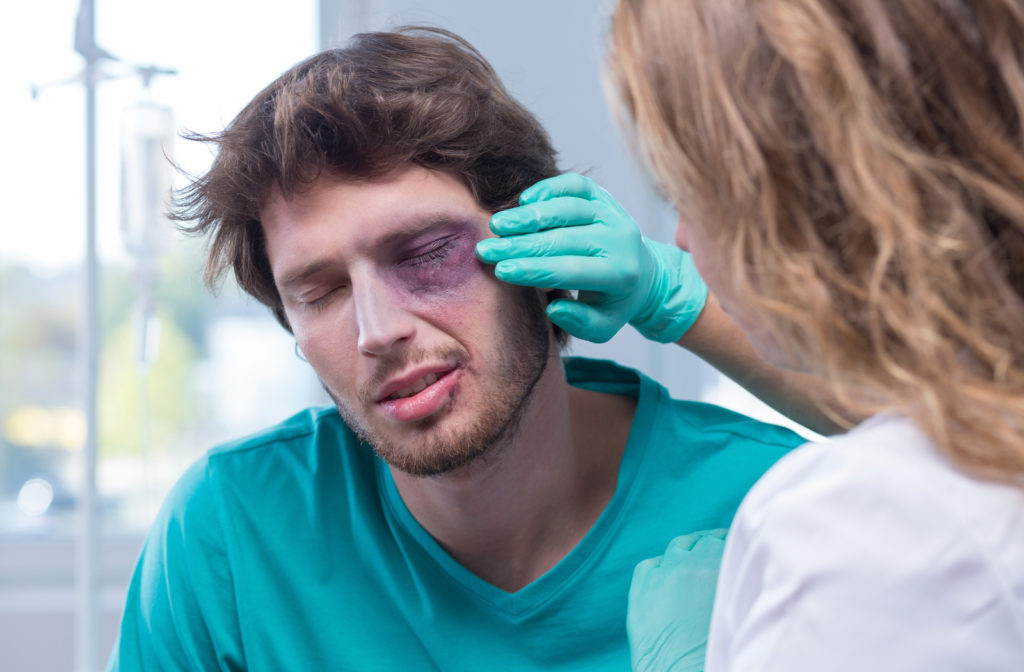If an emergency happens, you need timely medical attention. Your optometrist can help, but how do you know if your accident is an emergency?
Continue reading to learn more about the 10 signs you need to visit your eye doctor.
10 Signs You Require Emergency Eye Care
You typically know an emergency when you see one, but sometimes things can seem insignificant. Itchy or stinging eyes can feel normal, but they can be a symptom of something more serious.
To protect your eye health, learn about these 10 signs you should seek out emergency eye care:
Sudden & Unexplained Vision Loss
Certain conditions can lead to sudden and unexpected vision loss. Visit a medical professional for treatment as soon as possible if you lose some or all of your vision. There is typically a short window to prevent permanent damage to your eyes.
Some of the causes of sudden vision loss include:
Eye Pain or Discomfort Alongside Other Symptoms
Eye pain or discomfort is a common symptom for many eye conditions and diseases. It can be a symptom of corneal abrasions, styes, foreign bodies, and other complications. Eye pain on its own isn’t always a cause for concern, but other symptoms can mean you should visit your optometrist.
Seek emergency care if you experience eye pain alongside other symptoms, such as:
- Blurred vision
- Foreign body sensation
- Headache
- Nausea or vomiting
- Eye redness
- Tearing
- Clear or coloured discharge
Bleeding or Other Eye Discharge
Bleeding is always concerning, especially in your eyes. You typically won’t have blood leaking from your eye, but you can experience broken blood vessels or a hemorrhage. Eye bleeding can happen for several reasons, including:
- Injury or strain
- Hyphemas
- Medications
- Health conditions
- Infections
Besides bleeding, other eye discharge can mean you should see an eye doctor. You wash away mucus from your eyes each time you blink, but certain conditions can lead to an excessive amount of discharge developing.
Some possible causes of discharge include:
- Conjunctivitis
- Dry eye disease
- Blocked tear duct
- Keratitis
Flashes or Floaters
The occasional flash or floater isn’t an issue, but more of them than usual can be a symptom of several significant eye diseases. Flashes are bright spots in your field of vision that appear from time to time. Eye floaters are small hardened parts of your vitreous that float throughout the middle of your eye.
Both flashes and floaters are more common as you age, but they can mean you have a more serious issue. You may have a detached or torn retina or diabetic retinopathy.
You should visit your eye doctor if you notice:
- An abnormal amount of floaters
- Frequent flashes
- A shadow appearing in your peripheral vision
- A curtain-like shape covering parts of your vision

Itching, Burning, or Irritation
Eye irritation can occur during dry weather, but it can be a symptom of an underlying condition. While you can run a humidifier to keep your eyes moist, you should visit your eye doctor if your eyes feel irritated.
Itching, burning, or irritated eyes can be a symptom of:
- Allergies
- Foreign object
- Infection
- Dry eye disease
Extreme Allergic Reaction
You can suffer an allergic reaction when exposed to allergens like pollen, dander, and dust. Your reaction may be mild and go away with time, but don’t ignore a severe reaction. Seek treatment if you experience swollen eyelids, pain, or vision loss.
Harmful Chemical Contact
You should seek medical attention if chemicals come into contact with your eye. Before visiting your eye doctor, remove as much chemical residue as possible by rinsing your eyes with water for at least 20 minutes.
Hold the lids of the affected eye open while running your eye under a shower or tap. After rinsing your eye, avoid rubbing or touching it—this will may cause further damage. Visit your optometrist right away to have your eyes assessed.
Foreign Object in the Eye
Eyelashes, dirt, and dust can get into your eyes, but serious accidents can happen. You should seek immediate medical attention if a foreign object:
- Has sharp or rough edges
- Is large enough to stop your eyes from closing
- Contains chemicals
- Is stuck within your eye
- Is causing your eye to bleed
Never attempt to remove a foreign object yourself in an emergency. Restrict eye movement as much as possible and go to your optometrist’s office.
Bruising Around the Eye
Black eyes can be a minor injury, but you should watch for other symptoms. Significant trauma to the eye area requires medical attention. A black eye can be a repercussion of a facial fracture, concussion, ruptured eyeball, or damaged blood vessels.
You should visit your eye doctor if you notice these symptoms alongside bruising:
- Blood on the surface of your eye
- Swelling
- Eye immobility
- Blurry vision
Different Sized Pupils
Anisocoria is a condition where your pupils are of different sizes. Your pupil size can differ for many reasons, and some require emergency care.
Depending on the cause of your condition, anisocoria can develop alongside blurry vision, headache, vision loss, and other symptoms.
Some causes of this condition include:
- Eye trauma
- Concussion
- Optic nerve inflammation
- Brain tumour
If you experience different-sized pupils, visit your eye doctor for an assessment.
Protect Your Eye Health
Accidents happen, and when they do, your optometrist can help. Don’t ignore pain, irritation, or other signs of a problem. Visit your eye doctor right away if you experience any symptoms of an eye emergency.


